Backup on personal computers or servers is always important to prevent permanent data loss. Therefore getting to know different backup tools is very important, especially for System Administrators who work with large amounts of enterprise-level data and even on personal computers.
It is always a good practice to keep on backing up data on our computers, this can either be done manually or configured to work automatically. Many backup tools have different features that allow users to configure the type of backup, time of backup, what to backup, logging backup activities, and many more
In this article, we shall take a look at 25 outstanding backup tools that you can use on Linux servers or systems.
Honorable Mention – CloudBerry Backup
CloudBerry Backup for Linux is a cross-platform cloud backup solution with advanced backup configuration settings and provides total security of data.
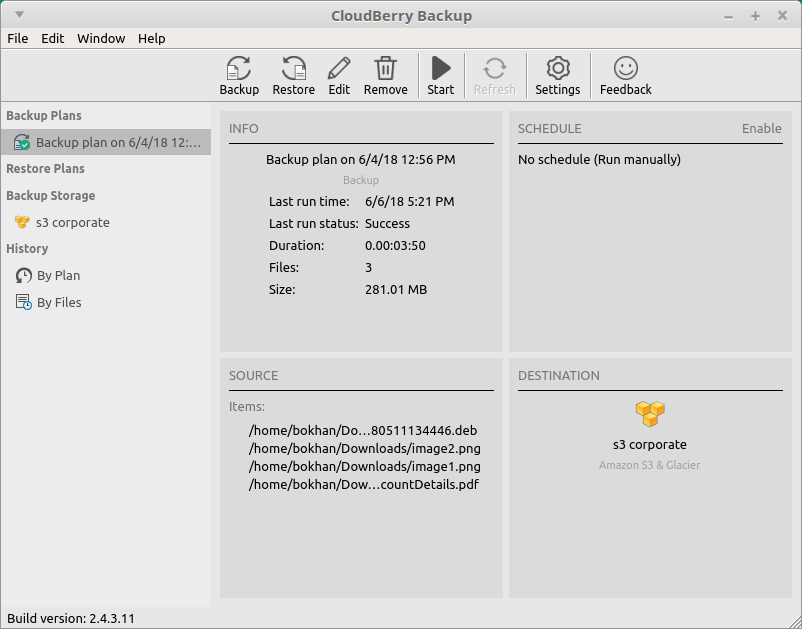
With this tool you can backup files and folders to the cloud storage of your choice: it supports more than 20 wide-known cloud storage services. CloudBerry Backup works with Ubuntu, Debian, Suse, Red Hat, and other Linux distributions and is also compatible with Windows and Mac OSs.
The primary backup features are:
- Compression
- 256-bit AES Encryption
- Scheduled backup
- Incremental backup
- Command-line interface
- Retention policy and more.
1. Rsync
It is a command-line backup tool popular among Linux users, especially System Administrators. It is feature-rich including incremental backups, updating the whole directory tree and file system, both local and remote backups, preserving file permissions, ownership, links, and many more.
It also has a graphical user interface called Grsync but one advantage of the rsync is that backups can be automated using scripts and cron jobs when used by experienced System Administrators on the command line.
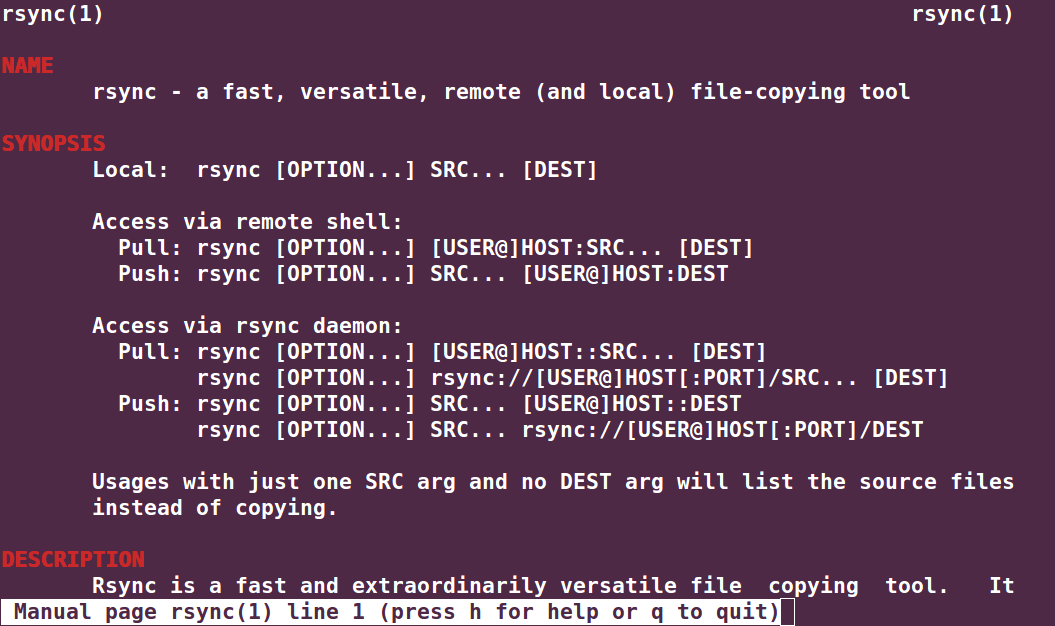
We’ve covered so many articles on the rsync tool in the past, you can go through them below:
2. Fwbackups
Fwbackups is free and open-source software that is cross-platform and feature-rich and users can contribute to its development or just participate in testing it. It has an intuitive interface that allows users to do backups easily.
It has features such as:
- Simple interface
- Flexibility in the backup configuration
- Remote backups
- Backup an entire file system
- Exclude files and directories plus many more
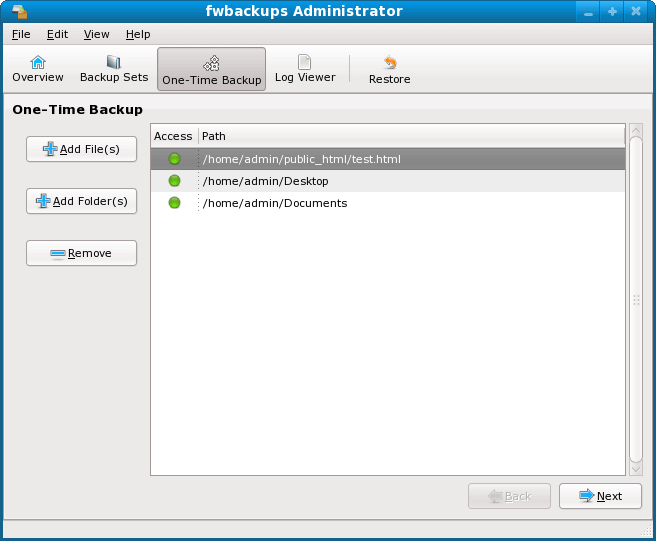
3. Bacula
Bacula is open-source data backup, recovery, and verification software that is designed to be enterprise-ready with certain complexities, though these complexities actually define its powerful features such as backup configurations, remote backups plus many more.
It is network-based and is made up of the following programs:
- a director: a program that supervises all operations of Bacula.
- a console: a program that allows a user to communicate with the Bacula director above.
- a file: a program that is installed on the machine to be backed up.
- storage: a program that is used to read and write to your storage space.
- catalog: program responsible for the databases used.
- Monitor: a program that keeps track of all events happening in different parts of Bacula.
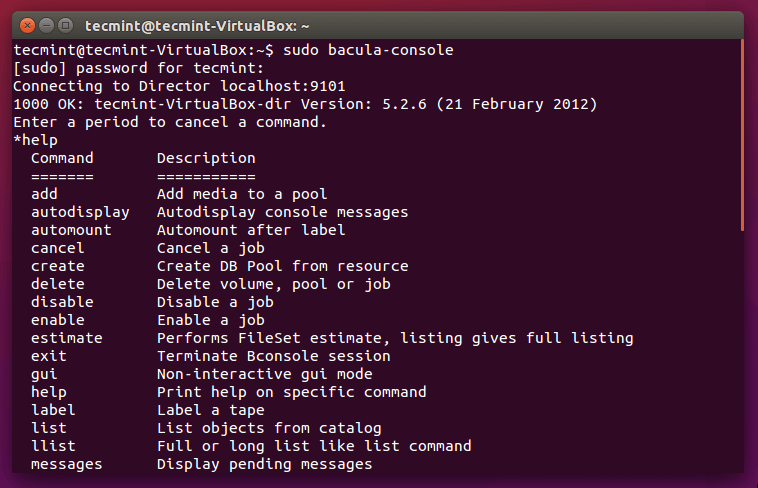
4. Backupninja
Backupninja is a powerful backup tool that allows users to design backup activity configuration files that can be drooped in /etc/backup.d/ directory. It helps to perform secure, remote, and also incremental backups over a network.
It has got the following features:
- Easy to read ini style configuration files.
- Use scripts to handle new types of backups on your system.
- Schedule backups
- Users can choose when status report emails are mailed to them.
- Easily create a backup action configuration file with a console-based wizard (ninjahelper).
- Works with Linux-Vservers.
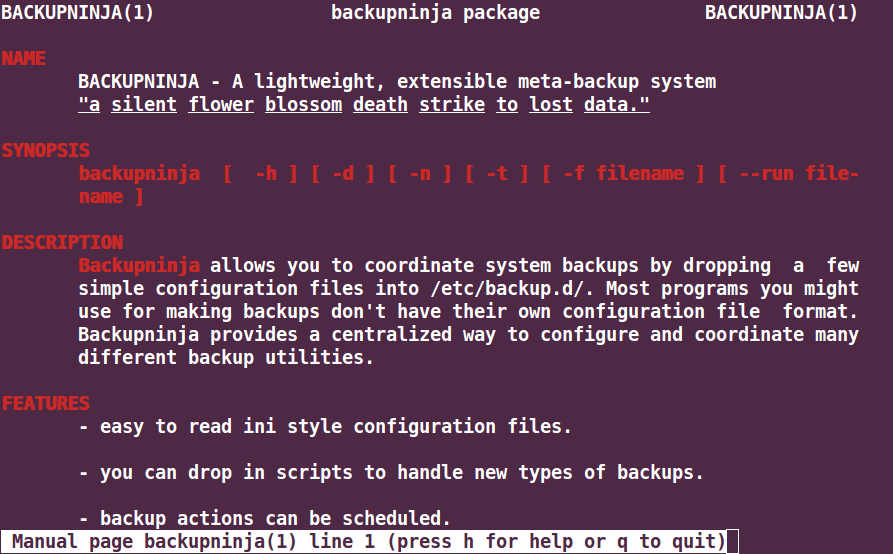
5. Simple Backup Suite (sbackup)
sbackup is a backup solution for Gnome desktops where users can access all configurations via the Gnome interface. Users can use regex to specify file and directory paths during the backup process.
It has the following features:
- Creates compressed and uncompressed backups.
- Supports multiple backup profiles.
- Allows logging, and email notifications.
- Scheduled backups and manual backups.
- Split uncompressed backups into several chunks.
- Supports local and remote backups.
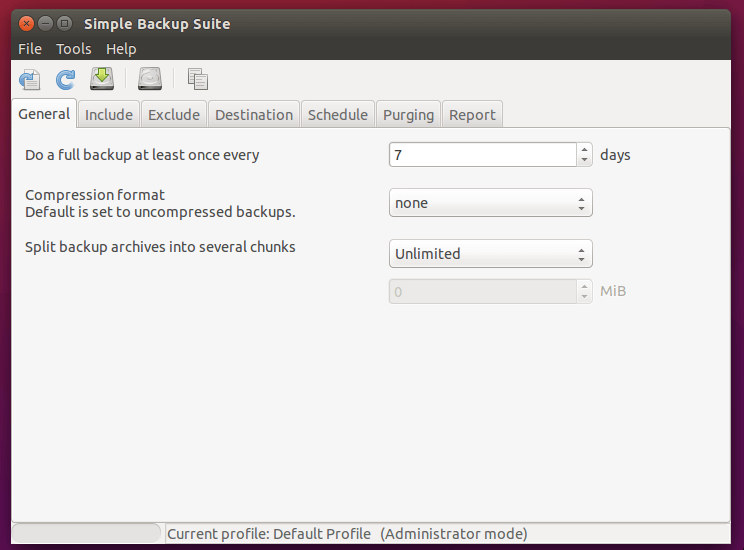
6. Kbackup
Kbackup is an easy-to-use backup tool for the Unix operating system and can be used on Linux. It can create archives and compress them using tar and gzip utilities respectively.
Kbackup has got the following features:
- User-friendly and menu-driven interface.
- Support for compression, encryption, and double buffering.
- Automated unattended backups.
- High reliability.
- Support for full or incremental backups.
- Remote backup across networks.
- Portable and extensive documentation among others.
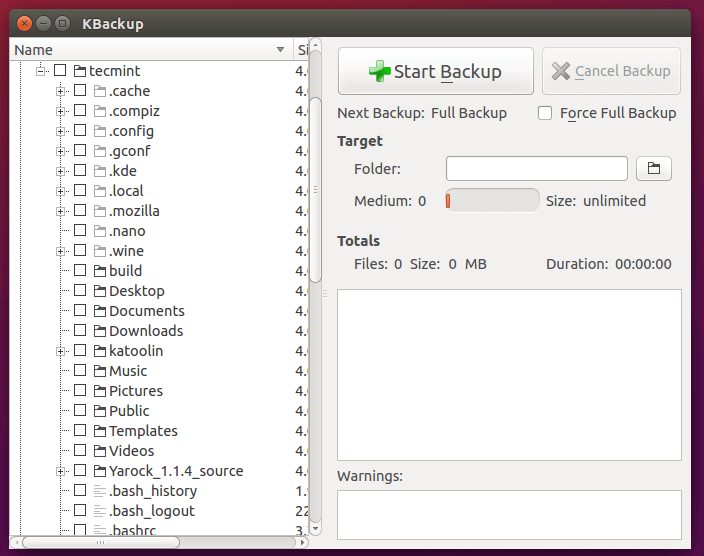
7. BackupPC
BackupPC is a cross-platform backup software that can run on Unix/Linux, Windows, and Mac OS X. It is designed for enterprise-level use with a high-performance measure. BackupPC can be used on servers, desktops, and laptop computers.
It has some of the following features:
- File compression to reduce disk space usage.
- No need for client-side software.
- Flexibility during the backup restoration
- Flexibility in configuring through different parameters.
- User notifications about the need for backups and so on.
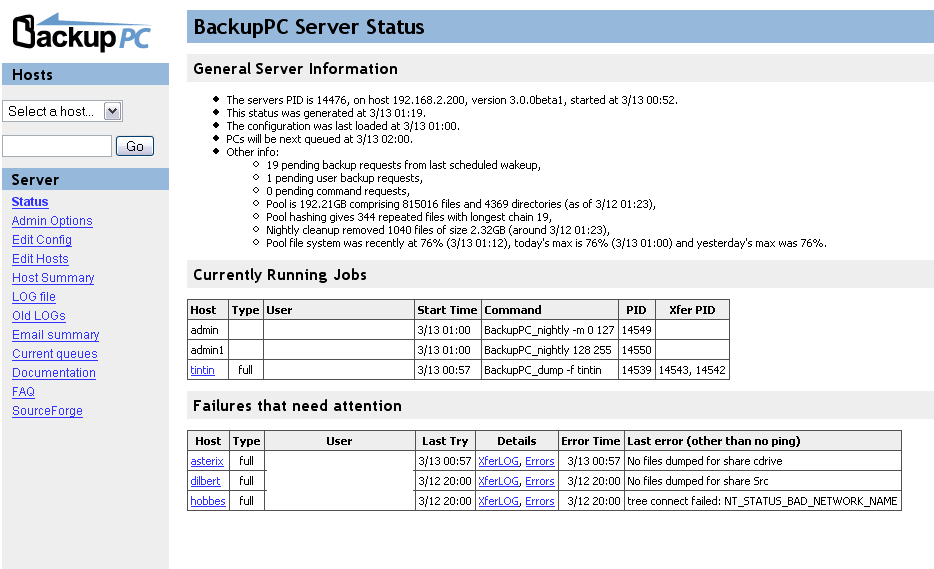
8. Amanda
Amanda is open-source software that works on Unix/GNU Linux and Windows. It supports native backup utilities and formats such as GNU tar for backups on Unix/Linux. And for backups on Windows machines, it uses a native Windows client. Users can set up a single backup server to store backups from several machines on a network.
9. Back In Time
Back In Time is a simple and easy-to-use backup tool for Linux operating system and works by taking snapshots of specified directories and backing them up.
It has features such as configuring:
- Storage location to save snapshots.
- Manual or automatic backups.
- Directories to backup.
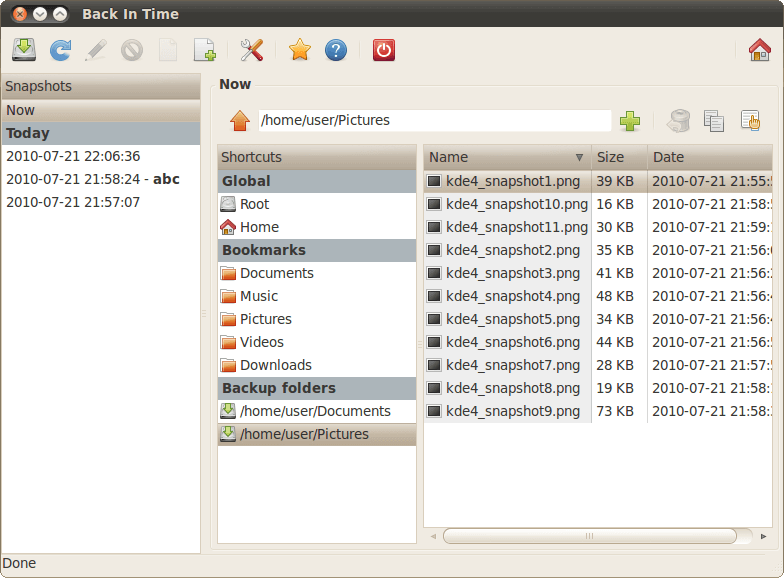
10. Mondorescue
Mondorescue is a free backup and rescue software that is reliable and all features-inclusive. It can perform backups from personal computers, workstations, or servers to hard disk partitions, tapes, NFS, CD-[R|W], DVD-R[W], DVD+R[W], and many more.
It also has data rescue and recovery abilities during the backup process in case of any destructive events.
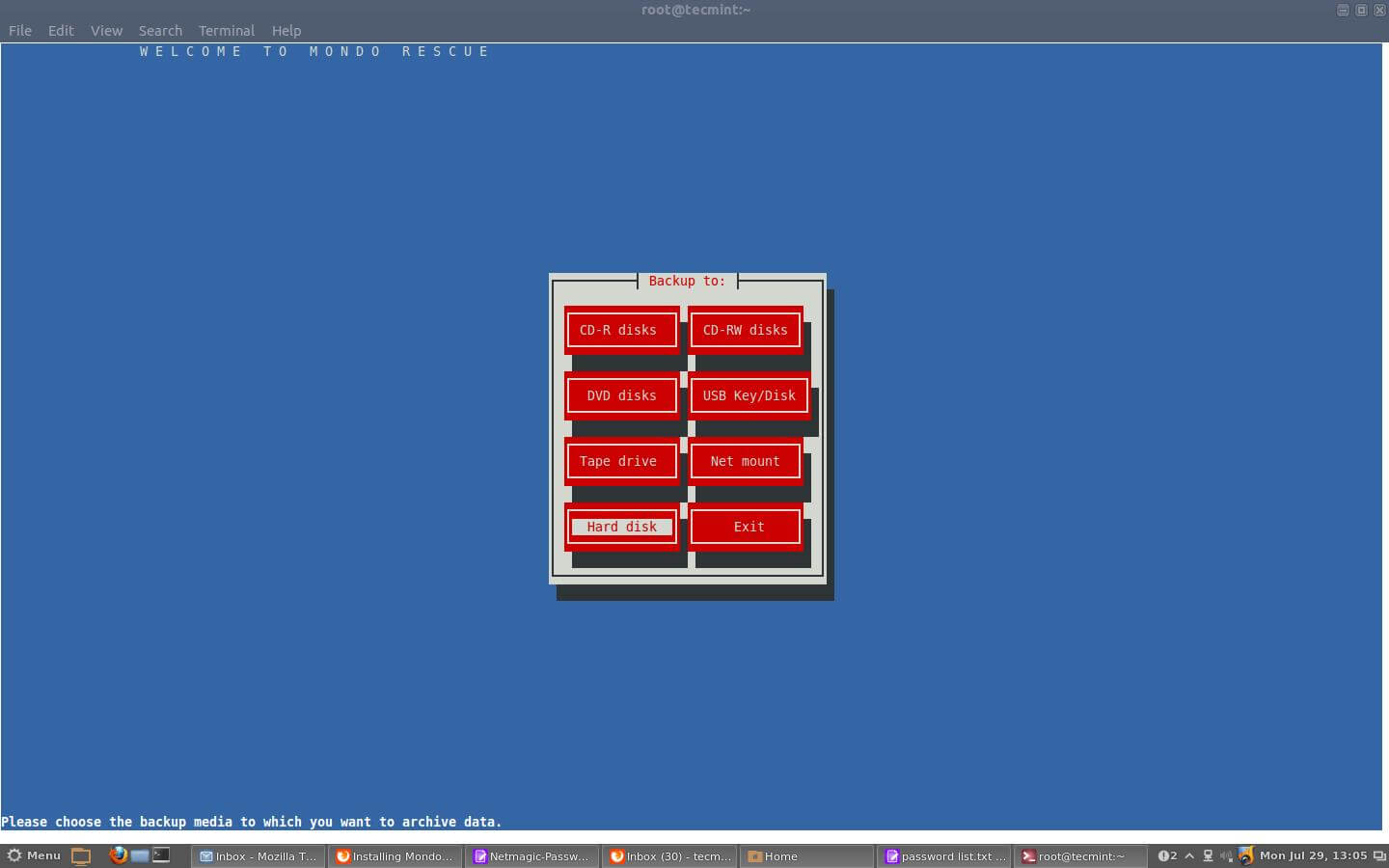
11. Box Backup
Box Backup is an open-source backup tool and can be configured to work automatically. It has features such as:
- Online backups
- Backup daemon for automated backups
- Storage of backups in files
- Data compression and encryption
- Tape like behavior
- Choice of backup behavior plus many others
12. Luckybackup
Luckybackup is a free powerful, quick, reliable, and easy-to-use backup and sync tool that is powered by the Rsync backup tool.
It is feature-rich with features such as:
- Preserve ownership and file permissions.
- Create multiple backup snapshots.
- Advanced options files and directories.
- Exclude options and use rsync options and many more.
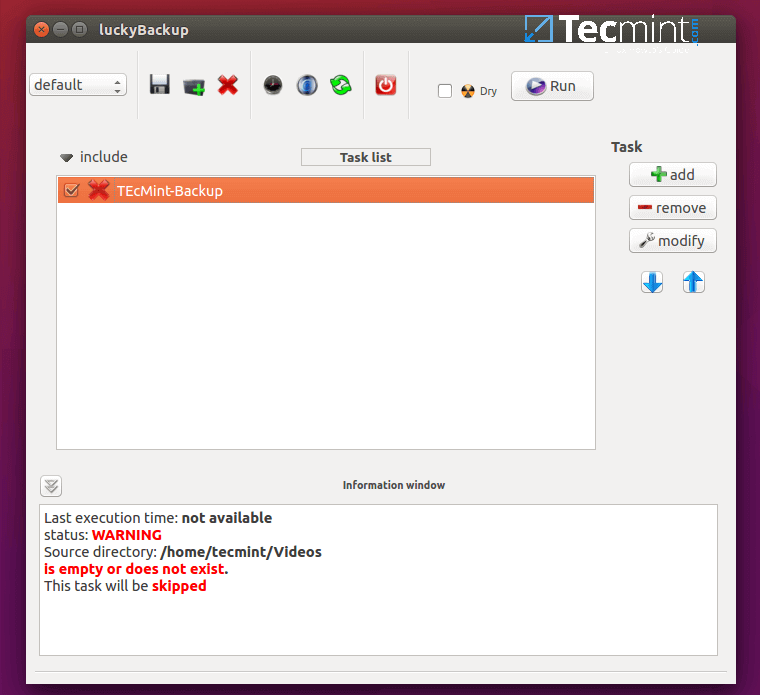
13. Areca Backup
Areca is an open-source backup tool that is intended for personal use and it allows a user to select a set of files or directories to backup and select the backup method and storage location.
It has features such as:
- Email notifications about the backup process.
- Simplicity in use in terms of configurations.
- Browse archives and many more.
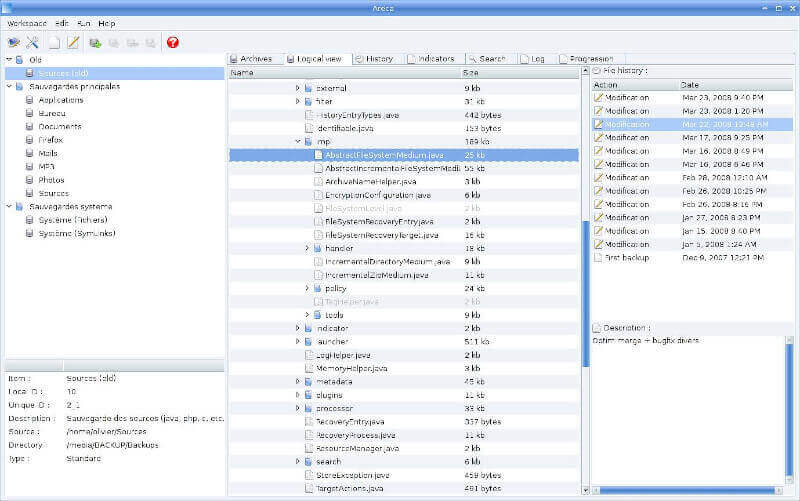
14. Bareos Data Protection
Bareos is an open-source set of programs that allows users to backup, recover, and protect data on Linux systems. It is an idea forked from the Bacula backup tool project and works on a network in a client/server architecture.
The basic functionalities are free but payment is required to use professional backup features. It has features of the Bacula backup tool.
15. BorgBackup
BorgBackup is a free open source, efficient as well as secure command-line-based deduplicating archiver/backup tool with support for compression and authenticated encryption. It can be used to perform daily backups and only changes in files since the last backup is archived, using the deduplicating approach.
The following are some of its key features:
- It is easy to install and use.
- Supports encryption of all data.
- Uses authenticated encryption techniques to ensure secure backups.
- It is also very fast.
- Supports space-efficient storage.
- It also supports optional compression of data.
- Supports remote backups over SSH.
- Supports mounting backups in the same way as filesystems.
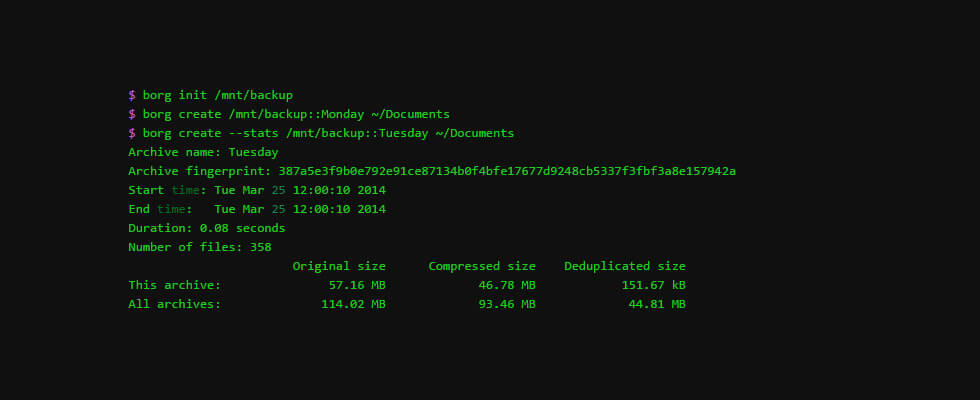
16. Restic
Restic is a free open-source, efficient, easy-to-use, fast and secure command-line-based backup program. It is designed to secure backup data against attackers, in any kind of storage environment.
The following are its key features:
- It is cross-platform, and works on Unix-like systems such as Linux, and also Windows.
- It is easy to install, configure and use.
- Uses encryption for securing data.
- It only backs up changes in data.
- Supports verifying data in the backup.
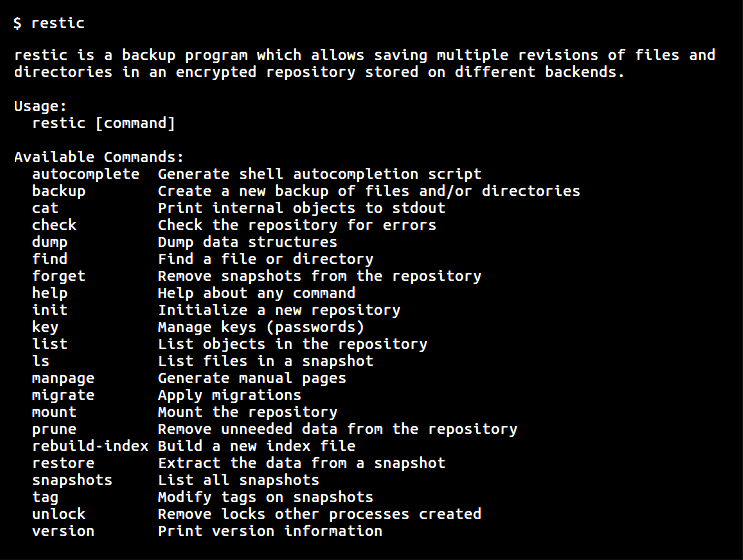
17. rsnapshot
Rsnapshot is a free open-source backup tool for Unix-like operating systems, based on rsync. It is designed to take a filesystem snapshot on local machines, as well as remote hosts over SSH.
Rsnapshot supports periodic snapshots and users can automate backups via cron jobs. In addition, it is also efficient in managing disk space used for backups.
18. Burp
Burp is a free open source, efficient, feature-rich, and secure backup and restores software. It is designed to work over a network in a client/server architecture (server mode works on Unix-based systems such as Linux, and clients run on Unix-based and Windows systems), and in that case aims to minimize network traffic for reliable results.
Below are its key features:
- Supports two independent backup protocols: protocol I and II; each with different features.
- Supports network backups.
- Supports resuming of interrupted backups.
- Supports backing up and restoring files, directories, symlinks, hard links, fifos, nodes, permissions as well as timestamps.
- It also supports the scheduling of backups.
- Supports email notifications about successful or failed backups.
- Offers a live ncurses monitor on the server.
- Supports storage data deduplication like many other backup tools.
- Supports compression of data on a network and in storage.
- Supports auto signing of SSL certificate authority and client certificate, and many others.
19. TimeShift
Timeshift is a backup and restores tool for Linux systems that takes incremental snapshots of the filesystem at regular intervals. It works in a similar way as rsnapshot (since it uses rsync and hard links to create snapshots), but offers certain unique features that are not present in its counterpart. Additionally, it is designed to only back up system files and settings.
The following are key features of Timeshift:
- Only takes a snapshot of system files and settings, user data such as pictures, music, etc are not archived.
- Takes filesystem snapshots using rsync+hardlinks, or BTRFS snapshots.
- Supports scheduled snapshots.
- Supports multiple backup levels with excluding filters.
- Allows for restoring snapshots during system runtime or from live devices(such as USB).
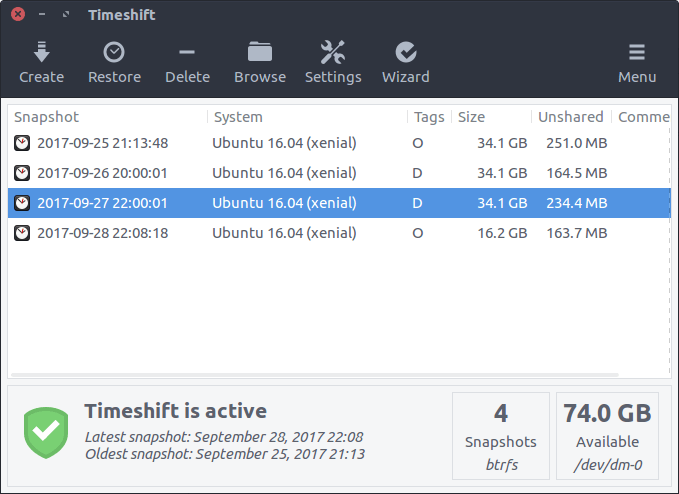
20. Duplicity
Duplicity is a free open source, secure and bandwidth-efficient backup tool based on rsync. It creates encrypted backups of directories in tar-format archives and backs them on the local or remote machine over SSH. When launched for the first time, it performs a full backup, and in subsequent backups in the future, it only records parts of files that have changed.
Below are duplicity’s key features:
- It’s easy to use and employs a standard file format.
- It only tracks and considers changes in files since the last backup.
- It creates incremental archives that are space-efficient.
- Creates encrypted and/or signed archives for security purposes.
- Supports signatures and deltas of directories and regular files in tar format.
21. Déjà Dup
Déjà Dup is a simple, secure, and easy-to-use backup tool for Linux systems built for encrypted, off-site, and regular backups. It allows for local, remote, or cloud backup storage with services such as Google Drive and Nextcloud.
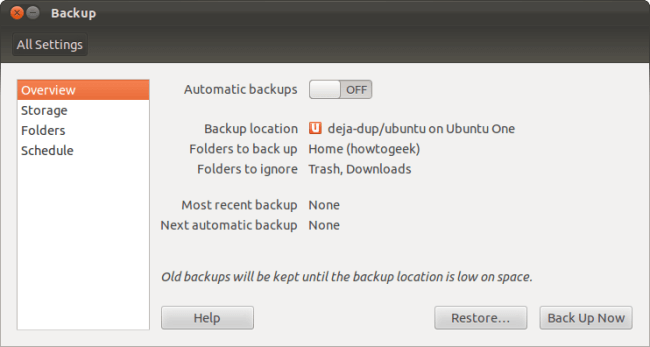
Below are Déjà Dup key features:
- Uses duplicity as the backend.
- Supports encryption and compression of data.
- Supports incremental backs up, allowing you to restore from any particular backup.
- Supports scheduling of regular backups.
- You can easily integrate it into a GNOME desktop environment.
22. UrBackup
UrBackup is an open-source easy to setup client/server backup system for Linux, Windows, and Mac OS X, that through a mixture of image and file backups carries out both data security and speedy restoration time.
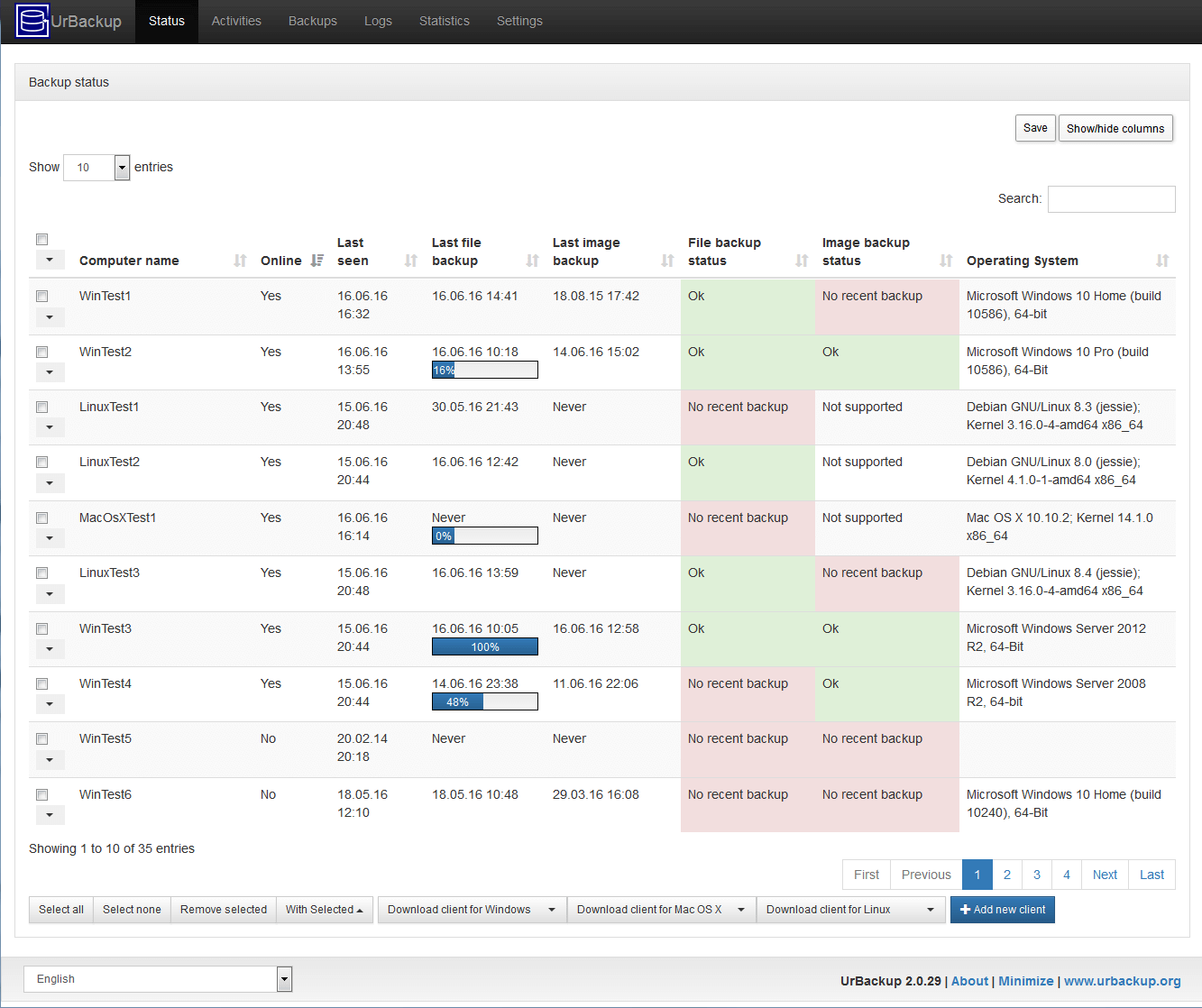
Below are UrBackup key features:
- Secure and efficiently complete and incremental image and file backups via a network.
- A web interface that displays the status of the clients, current activities, and statistics.
- Backup reports send to users or administrators.
- Easy to use file and image restore using CD/USB drive.
- Easy to configure and use file backup access.
- E-Mail notifications if a client machine is not backed up for a given amount of time.
23. rclone
Rclone is a powerful command-line program written in Go language, used to sync files and directories from multiple cloud storage providers such as Amazon Drive, Amazon S3, Backblaze B2, Box, Ceph, DigitalOcean Spaces, Dropbox, FTP, Google Cloud Storage, Google Drive, etc.
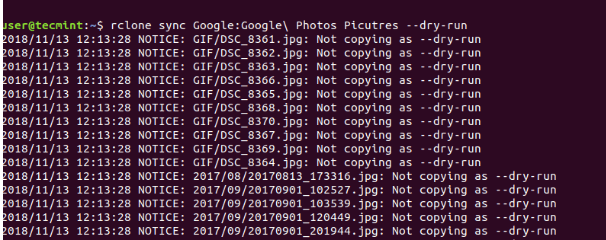
24. Relax-and-Recover
Relax-and-Recover is a setup-and-forget Linux bare metal disaster recovery and system migration program, which is used to create a bootable image and restore from an existing backup image. It also enables you to restore to the different system hardware and can, therefore, be used as a migration tool as well.
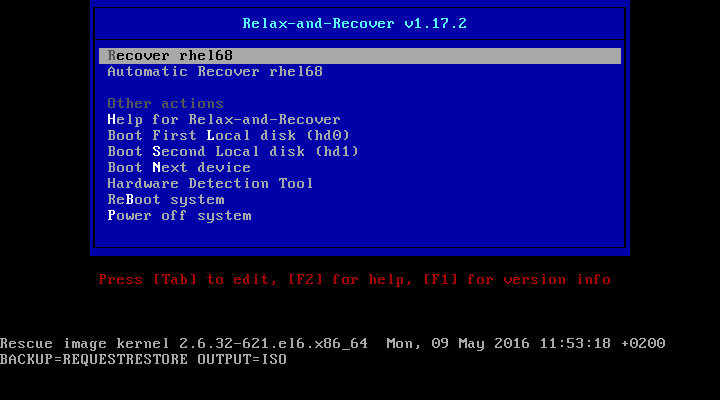
25. rdiff-backup
rdiff-backup is a powerful command-line backup program written in Python programming that is used to create local/remote incremental backups of a server or local machine, which means it only backup modified or changed files over a secured network via ssh by using a bandwidth-efficient rsync protocol.
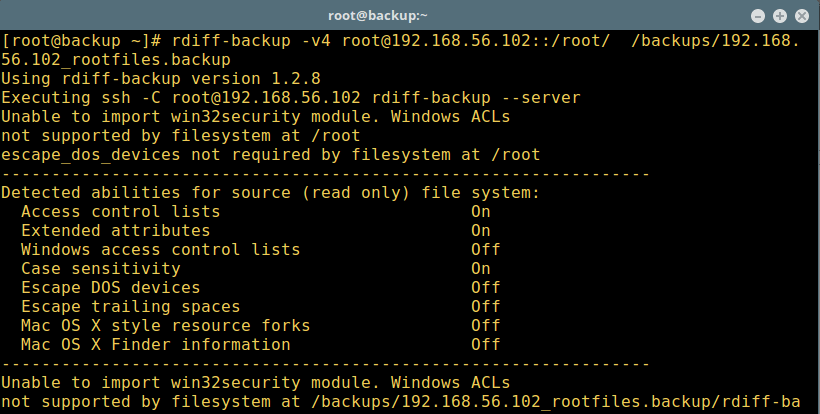
Summary
Always remember that backup is very important and helps prevent data loss and you can use various backup tools for Linux to carry out a regular backup of your data.
You could be using a backup tool that we have not looked at, let us know of it by posting a comment, and hope you find the article helpful and always remember to stay connected to Tecmint.com.

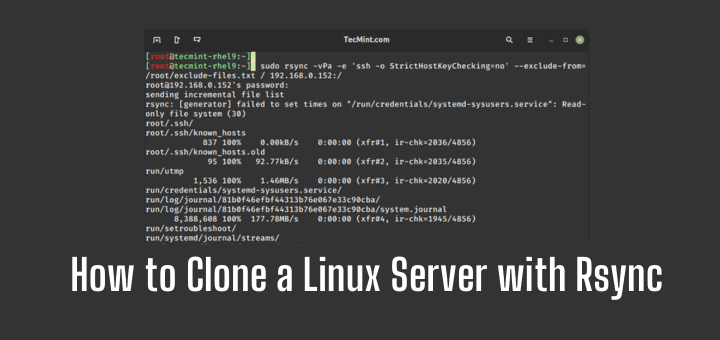
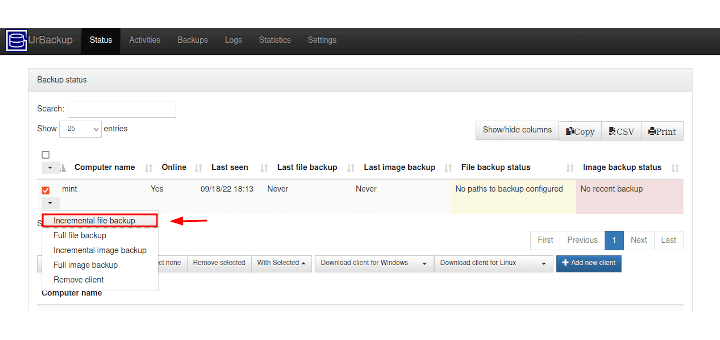
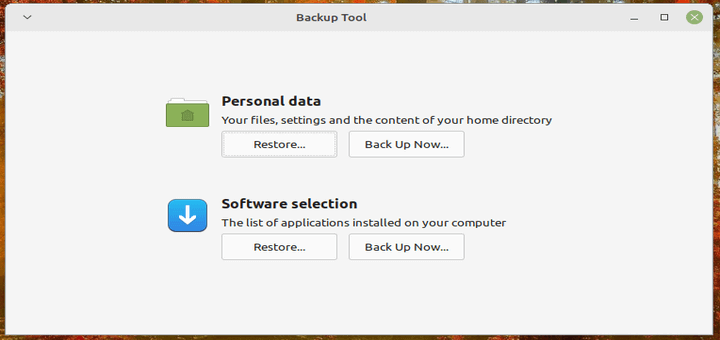
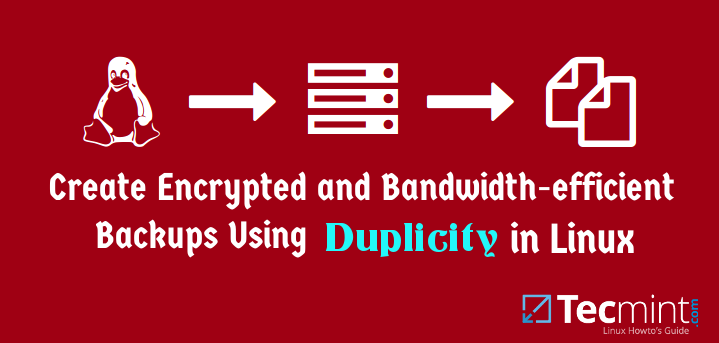


May I request that you add “XSIBackup-App” Linux backup tool to your list?.
It has a big advantage over many of the other ones, it is distro agnostic. It connects to the root file system via SSHFS and allows to backup directory trees, databases or virtual machines.
It also allows to run pre and post backup job scripts to prepare the job and it’s free without any file number or file size limitation.
One small omission is the Borgbackup graphical client – Vorta – available in several Linux desktops ‘repositories’ and/or Flatpak systems. Fairly easy to understand and setup, up once the server portion is installed on a remote machine.
Although a systems administrator, not a geek, I have used Borg on several client small networks – max. 15 clients on max 5 servers, with very satisfactory results.
The lack of a Windows client is a setback for some, but one client installed Windows 10 in a VM on a Mac machine to satisfy his desire for using Borg-only backup.
25 backup tools? Get out!
At least 15 of these don’t have enough users to have been real-world debugged. They shouldn’t even be here.
For the 10 that might possibly be worth considering, a table showing the features would have been useful. Finally, there should be been a recommendation, picking out the 2 or 3 utilities that are the front-runners for the various possible environments (desktop, server, multiple servers, etc).
Finally, a backup review mentions fwbackups. I’ve been using that for years now. Unfortunately, I believe it is no longer being maintained, but it still functions okay on openSUSE Leap 15.4.
The main reason I like it is that you can run the backups without encryption or archiving, thus allowing easy recovery of individual files. I back up to external drives on docking stations.
I dread the day when it fails to be run because of an OS update because then I’ll have to redo my entire 40TB data backup with some other utility.
Another backup to mention. That is very easy to use and has many options as a bar backup. The best part can be managed remotely.
http://www.kigen.de/projects/bar/index.html
@Shane,
Thanks for sharing, let me check before including it in the list…
It is worthy and notable that rdiff-backup ought to be a candidate. It requires SysAdmin kinds of knowledge to set up correctly, but it has real-world value once set up. I have used it for nearly 20 years now for customer-specific data backup scenarios and it just runs and runs with near zero maintenance. I run it with a wrapper script and setup in crontab for scheduling.
https://rdiff-backup.net/
@Keith,
Thanks for sharing your experience with rdiff-backup, we’ve covered separately about this backup tool here – https://www.tecmint.com/rdiff-backup-remote-incremental-backup-for-linux/.
Also, as suggested by you, we’ve included the rdiff-backup in this list…
Another simple and easy-to-use backup tool is Oak Backup.
Hi Aaron,
Please consider including Storix SBAdmin in this article. Their solution backups many flavors of Linux and Unix, including Red Hat, SUSE, AIX, Debian, Ubuntu, Oracle, and Solaris.
@Mark,
Sure, we will check the product and include it in the article…
Cool. Thanks!
For a “bare metal” backup/restore of the entire system’s data to or from a backup partition or another media the utility “Partition Image” included on “Hiren’s BootCD” works well.
A bit complicated figuring out the first time where the utility “Mount Devices” also included on the CD’s Linux based rescue environment might be of help. The backup files will be compressed with gzip, Hiren’s BootCD ver. 15.2 works for me.